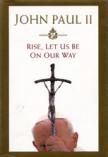One Bishop's Life
You have to warm to a man who spent the night reading The Old Man and the Sea after he received word that he was to be made a bishop.
The account of the future John Paul II reading Hemingway on a train as he returned, after being informed that he was to be made a bishop, to a group of young people with whom he was on a canoeing holiday makes an enticing prelude to his account of his 45 years as a bishop. The same is true of his comment that the archbishops of Krakow were usually selected from among the aristocrats, so it was a great surprise when after such a long line I, from the proletariat’ was named Archbishop of Krakow. Of the nomination, he objected to Cardinal Wyszynski, saying that at 38 he was too young. In response, the cardinal said, You’ll soon get over that.
But, disappointingly, this appealing beginning is followed by a long explanation of the consecration liturgy. As a whole, the book manages to make boring a life of dramatic experiences. With some exceptions (his pilgrimage to the Holy Land, books and study, acting), it provides few personal insights and reads as if the man disappeared when he became a bishop, although he has shown that this is not the case. Among the occasional personal moments or struggles that John Paul does share is his embarrassment in making his first pastoral visits to the sick:
At the beginning the sick intimidated me. I needed a lot of courage to stand before a sick person and enter, so to speak, into his physical and spiritual pain, not to betray discomfort, and to show at least a little loving compassion.
Only later did I begin to grasp the profound meaning of the mystery of human suffering.
In light of the above, the title, Rise, Let Us Be On Our Way, is particularly poignant, since nowadays the pope is seen most often in a wheelchair.
Rise also recounts the story of Nowa Huta, the industrial town Communists built on the outskirts of Krakow as a new, godless city for the new socialist citizen. There was no plan to build a church there, although the Catholic workers demanded one. Finally, after a 20-year battle against the police and the Communist Party, a church was completed in 1977. The future pope played a key role in the protracted conflict, which proved the church was closer to the workers than the party was. But this book leaches the drama and significance of that story and downplays the pope’s role in it.
In the foreword, John Paul II explains that the book was written in response to a request and coincided with preparation of a Vatican document about being a bishop. Maybe that is why the text resembles a how-to manual, concentrating heavily on the ministry of a bishop, his duties, the fatherhood of a bishop and so on. The book’s aim is edification rather than confession.
There is nothing here, for instance, as frank as St. Augustine’s complaint that his workload as a bishop was fit for a pack horse. And don’t expect even another Paul VI in these pages. Although the received wisdom is that Paul did not communicate as well as John Paul II, he was more open in his book-length interview with Jean Guitton, providing memories, opinions, sentiments and uncertainties. But perhaps there is no market today for a pope’s perplexities. In fairness, though, John Paul refers more than once to this book being a series of reflections, most, I would add, of equal brevity.
It is the publisher’s categorization of this book that raises a certain expectation in the reader that people will be brought to life in it; instead, events are recorded flatly, and there are embarrassingly banal sentences such as Religious orders serve the Church and the bishop and There’s no love greater than Love with a capital L. Rise covers 45 years in less than 200 pages, many of them filled with quotations from the Bible or Vatican documents.
John Paul’s years as bishop have been better recorded by several biographers. This lends support to reports that Rise, Let Us Be on Our Way was written partly by a Polish bishop and friend in the Vatican, Stanislaw Rylko, after discussions with John Paul. This could account for its excessively Polish perspective.
The first few books written by Pope John Paul during his pontificate were published by the Vatican, but, to the chagrin of Catholic publishers, world rights to his subsequent books were given to the Italian publisher Arnaldo Mondadori, whose first printing of this book was 500,000 copies. The Vatican retained control of translations of the new book because of publishing mistakes made with Crossing the Threshold of Hope. This happened most notably in the German version, where the chapter How He Saves Us appeared as How He Saved Himself, and in which the date of the pope’s first major document was given as the day of his election instead of a year later. That edition also omitted 10 consecutive lines of text, and transformed theistic interpretation of the world into atheistic interpretation of the world. This is a good illustration of the Italian saying that to translate is to betray.
It is claimed that Crossing the Threshold of Hope sold 20 million copies. The (London) Tablet quoted a publisher saying that there is great interest when the pope writes in an informal and intimate way. Such is the case only intermittently in this book. Although it will likely enjoy brisk sales, Rise, Let Us Be on Our Way hardly does justice to John Paul II.
This article also appeared in print, under the headline “One Bishop's Life,” in the February 28, 2005, issue.








